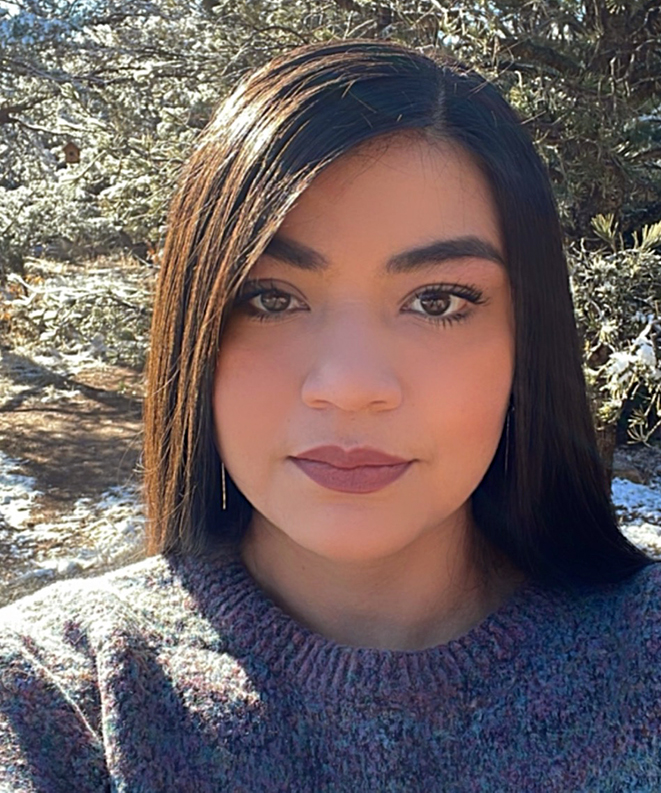Crystal A. Medina is listening closely as she meets with collaborative groups around New Mexico who are focused on restoring forest and watershed health.
“I’m trying to understand the needs of these collaborative groups and how the Institute can best help support them,” said Medina, who became the Collaboration program manager at the New Mexico Forest and Watershed Restoration Institute (FWRI) in February. “But I don’t want my entire job to just be going to meetings.”
She wants the collaboration program to help engage native New Mexicans in forest and watershed conservation projects – connecting them to resources, funding, and information. “Mostly I want them to feel they can have a seat at the table where decisions are made,” Medina said.

Medina is working with FWRI Director Dr. Alan Barton and Special Programs Manager Joe Zebrowski on launching a Collaboration Leadership Institute with assistance from the Rural Community Assistance Corporation. The goal would be to provide space and resources where groups could build their skills in areas such as grant writing, project management, personnel and board development, and networking – in short increasing their capacity to do the critical work needed on forest and watershed projects.
Barton managed the collaboration program before becoming the FWRI director. “With the growing threat of large, destructive wildfires, forests today are managed collaboratively across property boundaries by a variety of landowners, agencies, and stakeholders,” he said. “Around New Mexico, these have organized into place-based collaborative groups to coordinate land management, including practices that mitigate wildfire risk. These groups meet regularly to coordinate their management practices.”
“The FWRI is fortunate to have Crystal Medina leading our Collaboration Program,” Barton added. “Crystal is a dedicated professional with a good understanding of what it takes to make collaboration work, and experience working with a variety of different types of organizations. She has the knowledge and skills to advance collaborative practices that contribute to healthy forests around New Mexico.”
Medina grew up helping her grandparents on their farm along the Rio Chama near Española. “Farming and acequia culture were a huge part of my upbringing,” she said.
She moved to Mora as an adolescent, where her stepfather is a logger, with a livelihood that depended on the land. It deepened Medina’s understanding and appreciation for the land-based cultures and economies of Northern New Mexico.
After graduating from Mora High School, Medina earned a Bachelor of Sociology and Anthropology with a minor in Native American and Hispano Cultural Studies. “For one, I am from northern New Mexico and super proud of it,” she said. “Being able to study my own culture and region and where I grew up allowed me to have a different perspective aside from my lived experience.”
She went on to earn a Master of Arts in Public Affairs with an emphasis in Applied Sociology from New Mexico Highlands University.
Medina worked a stint with New Mexico Children, Youth and Families, first handling intake reports and later as a supervisor. “I liked engaging with the community and making people feel like someone was listening to them,” she said.
Later, she became director of a Science, Technology, Engineering and Math (STEM) grant at New Mexico Highlands University, before accepting the job managing FWRI’s Collaboration program. “I think the Hermit’s Peak-Calf Canyon Fire and all the work the Institute did in response to the fire, was really inspiring and something I wanted to be part of,” she said.
Medina is rebuilding a staff, hiring a collaboration technician and a VISTA worker.
And she’s thinking through how to help more people of color feel more comfortable sitting at the table with conservation groups and policy makers. “How do you make people who look like me feel welcome in these groups,” Medina said.
Medina can be reached at camedina@nmhu.edu.
See the FWRI Collaboration Map and find out more about the state’s collaborative groups under the Collaboration tab at nmfwri.org.
Find out more about the Rural Community Assistance Corporation at rcac.org.
The New Mexico Forest and Restoration Institute was authorized by Congress in 2004 and is housed at New Mexico Highlands University. The New Mexico Forest and Watershed Restoration Institute works to reduce catastrophic wildfires and restore resilient, fire- and climate-adapted ecosystems. We collaborate with partners and engage communities to bridge scientific and local knowledge and build capacity in landscape-scale adaptive management.
